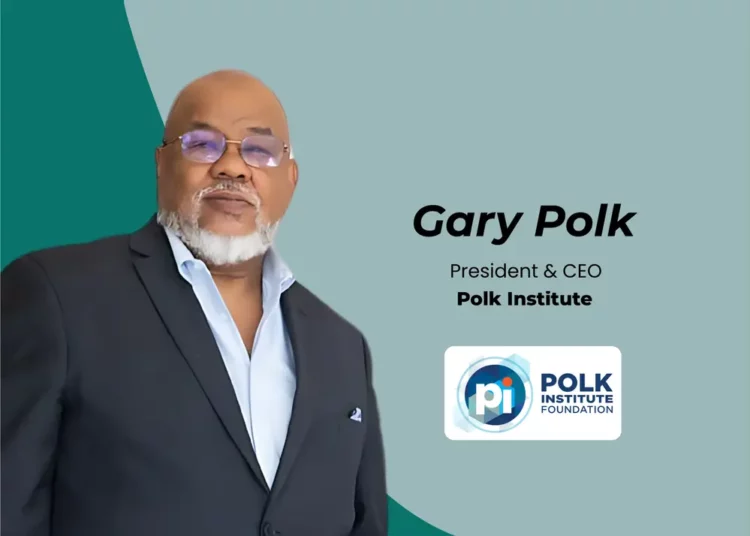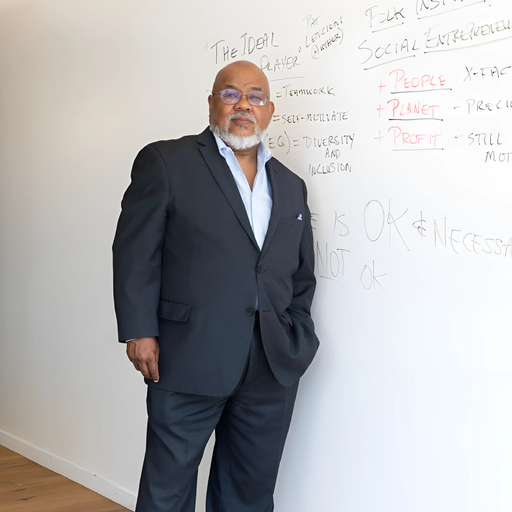Instead of asking ‘How?’ the first question every aspiring entrepreneur should answer is ‘Why?’. What if entrepreneurship isn’t just about building unicorns, but about healing communities?
Today, when every entrepreneur is obsessed with billion-dollar valuations, a powerful counter-narrative is taking root—one where success is measured not just in profit margins, but in lives transformed. At The Polk Institute Foundation (Pi), this isn’t just an idealistic dream, but a proven formula for change.
Gary L. Polk, the institute’s Founder, President and CEO, has masterfully fused his banker’s precision with an educator’s heart to pioneer a revolutionary approach: tuition-free, high-impact entrepreneurship training for those traditionally left out of the startup ecosystem.
Under his leadership, Pi isn’t just launching businesses—it’s building a new generation of Black and Brown entrepreneurs who see profit and purpose as perfect partners in progress.
Driven by his visionary approach to entrepreneurship and social impact, we at IMPAAKT had the privilege of sitting down with Gary to delve deeper into his remarkable journey, the transformative work of the Polk Institute, and the bold vision shaping the future of social entrepreneurship.
Below are the excerpts from the interview:
Gary, you’ve had a remarkable career journey spanning academia, business advising, and social innovation. What sparked your passion for teaching and mentoring entrepreneurs?
The spark began in 1991 at California State University, Northridge (CSUN), when I taught an Introduction to Business class for the Minority Business Program (MBP). This program aimed to address the shortage of Black and Brown business students. Initially, I declined the offer, but I later accepted and discovered my passion for teaching. Drawing from my banking experience, I taught students how to write business plans, emphasizing financials—“If the numbers don’t work, the boat won’t float!” I even brought bankers and financial colleagues as judges for presentations, creating a real-world experience.
When funding for the program ended for one year, I offered to teach for free, realizing teaching was my calling. Fast forward five years later, I turned down a high-paying insurance District Manager position to pursue my passion for teaching college full-time and become a Girls Varsity High School basketball coach to spend time with my kids. That decision—prioritizing my passion and family—was one of the best financial decisions that I’ve made.
As the Founder & CEO of the Polk Institute, what inspired you to create a platform dedicated to social innovation?
In 2017, while serving as Executive Director of the Innovation Incubator at CSU, Dominguez Hills, I attended three social entrepreneurship related events in one week. Hearing the stories of social entrepreneurs and nonprofits moved me deeply. When I left CSUDH, I realized there was little interest in a social entrepreneurship focus there, but I knew the value of this field. By September 2020, in the midst of the worldwide panic, we set out to do something positive in the wake of all the negativity and hardship created by COVID19. The Polk Institute Foundation (Pi) was founded as a nonprofit, innovation-driven enterprise that targeted underrepresented Black and Brown entrepreneurs. Pi provides tuition-free, practitioner-driven training and technical expertise with a clear mission: to empower social entrepreneurs and help make the world a better place. What started in 1991 at CSUN has almost made a full circle with the Polk Institute to complete the dream started 29 years earlier. BTW, the dream is still in progress.
How does the Polk Institute help entrepreneurs address pressing societal challenges while building sustainable ventures?
We teach ethical leadership and social entrepreneurship to shape CEOs who do business the right way. Our objective is to create fundable CEOs of high character. For decades, MBA business education emphasized profit maximization, which is flawed. We focus on balancing profitability with broader goals, instilling in leaders the skills to address societal challenges involving people and the planet while building sustainable ventures.
What do you believe is the most significant role of education in fostering the next generation of social innovators?
Education for the next generation must focus on three key pillars:
Character: As a banker, I learned character is the most critical of the 5 Cs of credit. Trust and integrity define success in any field.
Critical Thinking: Rapid technological advances, like AI, make critical thinking essential for effective leadership and innovation. Tomorrow’s leaders must navigate complex challenges, from space travel to environmental sustainability.
Social Entrepreneurship: Combining People, Planet, and Profit also known as the Triple Bottom Line creates a force multiplier for innovation. Countries in South America and Europe lead in this area, while the U.S. has catching up to do. Organizations like BCorporation certify only for-profit businesses committed to this triple-bottom-line approach. Nonprofits by their nature are assumed to be social entrepreneurs. Pi is a social entrepreneurship-focused organization.
You’ve spent decades mentoring entrepreneurs and startups. What are some common misconceptions that aspiring entrepreneurs have about the startup journey?
Overnight Success: Success takes years, not months. My mentor always said, “I was an overnight success, but it took 20 years.”
Technical Expertise Equals Business Acumen: Many assume being good at a technical job means they can run a business. This is a fatal error—successful businesses require knowledge of finance, operations, marketing, and sales.
The Public Will Love My Idea: Many believe their product or service will be an instant hit, but 7 out of 10 startups fail. Entrepreneurship is a tough, failure-prone journey akin to hitting a baseball.
My Personal Credit does not Matter. Many believe that once they establish their LLC or C-Corp, their personal FICO will no longer matter. Your personal FICO tells the banker or lender a great deal about your personal character.
The South Bay Entrepreneurial Center is a turnaround success story under your leadership. What strategies did you use to bring it from red ink to black ink?
First, we restructured our mentorship program, designating mentors as either primary or subject matter experts. Primary mentors acted like general practitioners, building relationships with clients and referring them to specialists when needed.
Secondly, and most importantly, we went beyond startups and began to target existing businesses. We found established businesses that could afford our fees and needed help scaling. This shift to a fee-based model brought us into the black within a year.
With a background in both finance and ethics, how do you guide entrepreneurs to prioritize both profitability and social responsibility?
We use the People, Planet, Profit framework:
People: We teach entrepreneurs to focus on employees by creating an employee-centric culture. When employees are respected and valued, they take care of customers, leading to long-term success. Hire slow, fire fast. When it comes to customers, if you can maintain an 80% customer retention rate you can be sustainable.
Planet: Our workshops help businesses become socially responsible, guiding them to achieve BCorporation certification. This ensures they implement policies that balance purpose with profit.
Profit: To truly be in business, you must have paying customers. It starts with one paying customer. Then you must figure out how to commercialize and scale your business to build a million-dollar business. You must have clients willing to pay for your product or service. You must know your numbers and Key Performance Indicators (KPIs). You must efficiently and effectively manage your KPIs that include profit margins, break-even analysis, cash flow, and burn rate and your balance sheet.
If you could implement one significant change in the way entrepreneurship is taught or practiced, what would it be and why?
Proof of Concept is crucial. Entrepreneurs need to validate their ideas before investing heavily in prototypes or pre-revenue expenses. Conducting 100+ interviews with potential customers helps define target personas and refine market strategies. If 80% of respondents respond positively, entrepreneurs can confidently proceed with a detailed business plan, saving time and money.
What are your long-term goals for the Polk Institute, and how do you envision its impact on the broader community of social innovators?
We have five strategic goals:
- Expand our Board of Directors from 5 to 15 members.
- Achieve a $1 million budget in three years and $5 million in 5 years. Open a physical office in the South Bay/Long Beach region.
- Build partnerships with corporate and sports industries and continue with our Banker supporters. Launch an individual donor program
- Scale our Legacy program nationwide and launch a youth entrepreneurial program.
- Reach our vision of launching 1,000 social ventures by 2032.
These goals position us to drive significant change in the entrepreneurial and social innovation landscape.
Looking back at your career, what are you most proud of in your work with the Polk Institute and the many entrepreneurs you’ve mentored?
Two things stand out:
OUR PEOPLE—The Team: We’ve assembled an amazing group of over 30 professionals dedicated to our mission, vision, and values who’ve contributed over 27,000 volunteer hours from 2020 to 2024. Their support has been priceless.
OUR PEOPLE–The Cohort Members we serve: We’ve worked with over 120 social entrepreneurs, each bringing character, coachability, and gratitude. Their success stories are priceless, and being part of their journey is incredibly rewarding.
At the Pi, we realize that Our People are Priceless and what make us special!

 More about Gary Polk
More about Gary Polk










